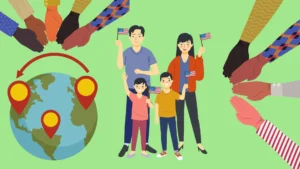
Family reunification is a cornerstone of immigration policies worldwide, allowing immigrants to reunite with their immediate family members who are already settled in the host country. These policies aim to promote family unity, support integration, and uphold humanitarian principles. This blog explores the significance of family reunification in immigration policies, key considerations, challenges, and examples of how countries approach this important aspect of immigration law.
Importance of Family Reunification
Promoting Family Unity
Family reunification policies recognize the importance of maintaining family ties and support networks. Reuniting families allows immigrants to live together, support each other, and contribute to their host communities while preserving cultural and familial bonds.
Supporting Integration
Immigrants who are able to reunite with their families are more likely to integrate successfully into their new environments. Family support networks provide emotional stability, social connections, and practical assistance in navigating unfamiliar systems and cultures.
Humanitarian Considerations
Family reunification upholds humanitarian principles by protecting the right to family life and preventing the separation of spouses, parents, and children. It acknowledges the importance of familial relationships in promoting individual well-being and societal cohesion.
Key Considerations in Family Reunification Policies
Eligibility Criteria
Countries define eligibility criteria for family reunification, typically focusing on relationships such as spouses, children, and sometimes parents or siblings. Requirements may include proof of relationship, financial support capabilities, and legal residency status.
Processing and Wait Times
Processing times and wait periods for family reunification applications vary widely among countries. Delays in processing can prolong family separation and impact integration outcomes for immigrants.
Financial Support and Sponsorship
Many countries require sponsors to demonstrate financial stability and ability to support family members financially without relying on public assistance. This requirement aims to ensure that immigrants do not become a financial burden on the host country.
Integration Requirements
Some countries impose integration requirements as part of family reunification, such as language proficiency, cultural knowledge, or participation in integration programs. These requirements help facilitate successful integration and participation in society.
Challenges in Family Reunification Policies
Backlogs and Processing Delays
High demand for family reunification often leads to backlogs and lengthy processing times, causing prolonged separation for families and frustration among applicants.
Financial and Sponsorship Requirements
Meeting financial criteria and sponsorship obligations can be challenging, particularly for low-income families or sponsors facing economic hardship.
Legal and Administrative Barriers
Complex immigration laws, bureaucratic procedures, and changing policy frameworks can create barriers to family reunification, particularly for immigrants from disadvantaged backgrounds or conflict-affected regions.
Examples of Family Reunification Policies
Canada
Canada’s family reunification program allows Canadian citizens and permanent residents to sponsor their spouses, dependent children, parents, and grandparents for immigration. The program emphasizes family unity and provides pathways for family members to reunite in Canada.
Germany
Germany offers family reunification opportunities for recognized refugees and asylum seekers, allowing them to reunite with immediate family members, including spouses and minor children. The process involves proof of family relationship and compliance with integration requirements.
United States
In the United States, family-based immigration allows U.S. citizens and lawful permanent residents (green card holders) to sponsor family members for immigration, including spouses, parents, children, and siblings. The process involves petitioning for family members and meeting eligibility requirements.
Future Directions in Family Reunification Policies
Expansion of Eligibility
Countries may consider expanding eligibility criteria for family reunification to include extended family members, domestic partners, or other dependent relatives not currently covered under existing policies.
Streamlining Processes
Improving efficiency in processing family reunification applications and reducing wait times can help minimize family separation and promote timely reunification.
Balancing Security and Humanitarian Needs
Balancing security concerns with humanitarian imperatives is essential in shaping family reunification policies that uphold human rights, protect vulnerable individuals, and support family unity.

Unskilled Jobs with Visa Sponsorship in Norway (2025) – Real Opportunities or Just Rumors?

Constric Are the Best Immigration Consultancy Agency in Saudi Arabia


Unlocking Dubai Dreams: Your Simple Guide on How to Get Tourist Visa for Dubai from India 2025

How to Apply for Job in Dubai – Landing Your Dream Role 2025





